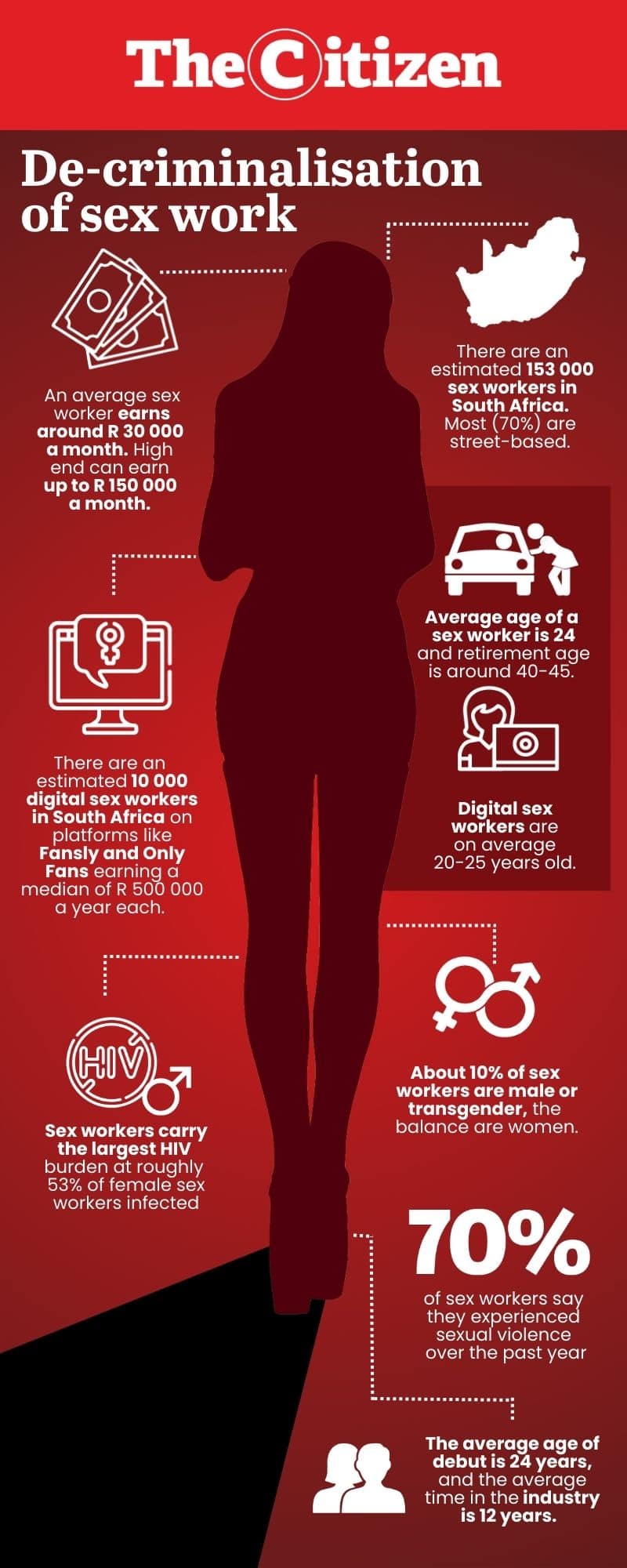With 153 000 sex workers and an illicit economy worth R60 billion, South Africa faces a pivotal legal and political debate on decriminalising sex work.

The decriminalisation of sex work in South Africa may take a giant leap forward next week as activists and their opponents face off in the Western Cape High Court in Cape Town.
And, pending the outcome of the case, the National Prosecuting Authority issued a moratorium this week on the prosecution of sex workers.
The initial case was brought by the Sex Workers Education and Advocacy Taskforce (Sweat) last year to declare criminalisation of sex work unconstitutional.
Voices for and against decriminalisation
Human Rights Watch and Amnesty International, along with several other supporters, agree that the law denies sex workers justice, health and safety.
A Sweat spokesperson said: “The moratorium affirms the seriousness of the case and marks an important step toward recognising sex workers’ rights”.

Earlier this year, the department of justice and constitutional development filed a response, saying it supports decriminalisation and asked the court to give parliament time to complete its amendments to the law.
Cause for Justice (CFJ), an organisation opposed to the decriminalisation of prostitution, has stepped in along with, it claimed, 17 other parties to argue to keep sex work illegal.
A CFJ spokesperson said prostitution “involves the commodification of the human body, reducing human beings to commercial sex objects or commodities for the sexual gratification of predatory individuals. It violates their personhood and equal dignity as members of the human family.”
The Sexual Offences Act prohibits the buying and selling of sex. Brothels are illegal. Even loitering with the suggestion of intent to sell sex is a crime.
An illicit economy
Sex work is one of South Africa’s largest illicit economies after the illegal wildlife trade. At an estimated R60 billion a year, it also out-earns Gauteng’s entire tourism sector, which is valued at R41 billion, and the legitimate cannabis industry which is estimated at about R31 billion locally.
ALSO READ: ‘It’s survival, not shame’: A sex worker’s journey through exploitation and independence
Current estimates suggest that there are about 153 000 sex workers in South Africa, most of them street-based.
The average age of entry is 24, with workers spending about 12 years in the trade before retiring in their early 40s.
While brothel-based and independent sex workers earn more, street-based workers take home less than a third what top-tier workers get.
A “high-class” escort in Joburg can charge up to R30 000 for an overnight booking, while mid-tier services range from R1 000 to R1 500 an hour.
Across the sector, average monthly earnings are about R30 000, with high-end workers making R150 000 and more.
If taxed, this workforce could generate a potential R8.4 billion in annual income tax, enough to fund the government-budgeted school fees of nearly 380 000 pupils at R23 000 a year each.
The dark side
But there is a dark, social element to sex.
According to CFJ, research and first-hand accounts “show that prostitution is inherently exploitative, violent and abusive, and is associated with an array of destructive and harmful consequences for the individuals involved in it, their families, surrounding communities and the rest of society. Prostitution is an irredeemable vice.”
Studies show that 70% of South African sex workers experienced sexual violence in the past year and more than half endured multiple incidents.
Criminalisation, activists like Sweat argue, is directly fuelling public health crises and gender based violence.
ALSO READ: Actress Denise Richards explains why her husband runs her OnlyFans account
Legal and political developments
In 2010, the Constitutional Court upheld criminalisation of prostitution and yet in the same year, the Labour Appeal Court suggested that some workplace protections could still apply to sex workers.
In December 2022, Cabinet published a Bill to repeal the old statutes and decriminalise consensual adult sex work. But momentum was lost.
Lisa Welsh, sex educator and counsellor, said continuing criminalising consensual sex work “pushes workers into the shadows, makes them more vulnerable to violence, exploitation and isolation, and it takes away their ability to report abuse”.
A psychologist agreed. “When the state tells you that your work makes you a criminal, it reinforces shame and isolation,” he said.
“That shame is internalised, and it bleeds into mental health. We see high levels of depression, post-traumatic stress and substance abuse among sex workers.”
Politically, the debate remains fractured. According to a 2024 survey by GroundUp, the DA supported full decriminalisation, including regulation of brothels and licensing, while the EFF also back full decriminalisation.
The Inkatha Freedom Party supports rights to safety and health care.
ActionSA supports decriminalisation for workers but wants solicitation and client-related offences to remain illegal.
The Patriotic Alliance backs regulation and taxation but not client criminalisation.
The Freedom Front Plus opposes reform outright, while Rise Mzansi supports full legalisation based on constitutional rights.
ALSO READ: ‘A virgin and devout Christian’: Sophia Rain reveals she made over R780 million on OnlyFans
The ANC and uMkhonto weSizwe party have yet to table any formal position.
Growth of the digital sex economy
Parallel to the street and brothel economy, South Africa’s digital sex economy is exploding along with the rest of the world.
A July tally counted nearly 10 000 South African adult content creators on the social pay per view platform OnlyFans.
Almost 90% of their content was paywalled, with average subscriptions just over $5 (about R90) a month.
Median annual earnings sat at about R500 000, with top performers earning more than R2 million.
Fetish markets thrive on niche platforms like Fansly and FeetFinder, where worn underwear, socks and personalised fetish clips sell for top dollar.
Globally, the digital erotic content creator market is estimated at half a trillion dollars.
Digital sex work is not criminal in South Africa, but countries like Sweden have outlawed it.
The Nordic country’s legislators equate the purchase of live digital sex acts with traditional prostitution, with penalties of jail time for buyers.
For South African creators, the fear is that regulatory changes abroad may one day creep onto their platforms, too.
NOW READ: Sex work is work, treat it that way






